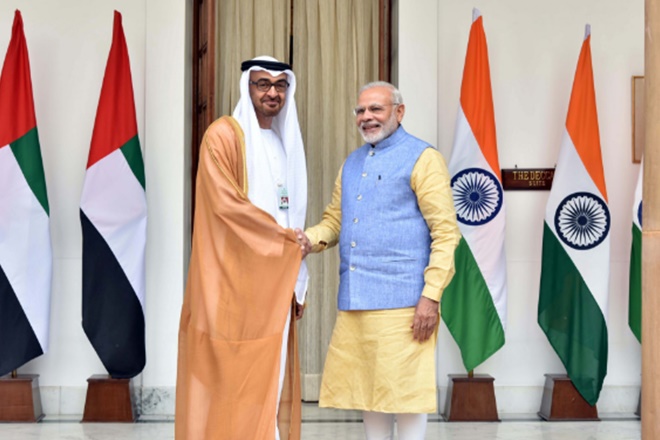Modi’s visit of great significance: UAE minister
India is the UAE’s second largest trade partner today and the UAE has become India’s third largest trading partner

By IAR
The visit of Indian Prime Minister Narendra Modi to the UAE is of great significance to the UAE, according to the UAE’s Minister of Economy Sultan bin Saeed Al Mansoori.
an article titled “Beyond Borders” to welcome Prime Minister Modi’s visit to the UAE, published in Gulf News, the minister writes that expanding strategic collaboration between India and the UAE is now set to cover new sectors and areas.
“India is the UAE’s second largest trade partner today and the UAE has become India’s third largest trading partner, with the total non-oil trade between the two countries recorded at $35.9 billion in 2018. The strength of this bilateral trade relationship is evident in many sectors such as oil, infrastructure development, tourism and aviation. Against this backdrop, Prime Minister Modi’s latest visit to the UAE reaffirms the close relationship between the two countries, which is built on historical, deep-rooted and age-old cultural, religious and economic ties and based on mutual respect and common interests, as well as fruitful cooperation in various fields for the development and prosperity of the two countries. India’s partnership with the UAE is set to play a key role in its march towards its ambitious goal of becoming a $5 trillion economy,” the article says.
Elaborating on the commercial ties between the two countries – there are currently 4365 Indian companies, 238 commercial agencies and 4862 trademarks registered in the UAE, and inward Indian FDI stock into the UAE amounted to $6.2 billion at the end of 2017 – the minister writes that “Owing to our progressive economies and world-class infrastructure, both India and the UAE are attracting significant attention in terms of investments.”
The article mentions the agreement signed by the Abu Dhabi National Oil Company (Adnoc) with a consortium of Bharat Petroleum Corporation Limited and the Indian Oil Corporation Limited, for exploration rights for oil and gas in Onshore Zone No. 1, where the consortium will invest $170 million with 100 per cent stake and the establishment by India’s Reddy Sidi Groupℑ of a cement clinker plant in Fujairah in March 2019, with an investment value of about $177 million as the most significant agreements between the two sides in recent times.
Observing that the UAE ranks “first in the Arab world and the tenth in the world in terms of the balance of foreign direct investment to India during the period from April 2000 to June 2018” – FDI from UAE amounted to $5.84 billion, the article goes on to say that “India’s vibrant economy, progressive policies, growing job opportunities, technological competence, dynamic stock market, and its role as a key global economic player are most notable. Besides, structural reforms such as Goods and Services Tax (GST) and ease of doing business are further accelerating India’s growth. The UAE has great admiration for India and appreciate and respect the resident Indian community in the UAE for actively contributing to the UAE’s progress.”
The article concludes, saying “The Prime Minister’s visit to the UAE would further bolster the bilateral ties between both countries. We are confident that the outcomes of this visit will further strengthen our nations’ bonds as partners and as friends.”
This is Modi’s third visit to the UAE in four years, and the first in his second term as prime minister. He will be honoured with the UAE’s highest civilian honour – the Order of Zayed. During his first term as prime minister UAE Crown Prince Sultan Mohammed bin Zayed Al Nahyan had twice visited New Delhi, the second time as the Chief Guest for the country’s Republic Day celebrations.
The visit comes soon after India revoked Jammu and Kashmir’s special status, amidst a shutdown in the Kashmir valley to preempt any violence. Tensions with neighbouring Pakistan has been on the rise since as the country has been upping the ante ever since, trying to get the international community to pressure India to rescind it’s decision with threats of war, suspending diplomatic relations, halting trade and bus and train services to India, and even taking the issue to the UN Security Council but which yielded no result. Meanwhile life in the Kashmir valley is limping back to normal with restrictions being lifted incrementally.